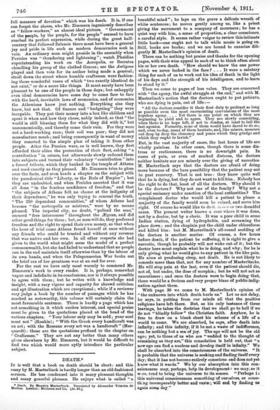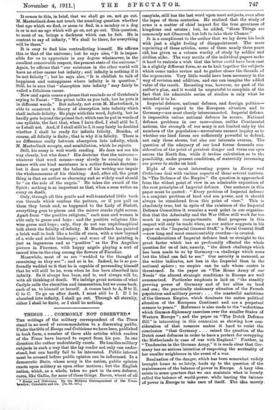DEATH.*
IT is well that a book on death should be short: and this essay by M. Maeterlinck is hardly longer than an old-fashioned sermon. He has condensed into it many pleasant thoughts and many graceful phrases. He enjoys what is called "a • Death. By Maurice Maeterlinck. Translated by Alexander Teixeira de Mattoe. London ; Methuen and Co. Os. 6d.2
beautiful mind"; he lays on the grave a delicate wreath of white sentences ; he moves gently among us, like a priest giving the sacrament to a company of mourners ; he has a quiet way with him, a sense of proportion, a clear conscience, a careful style. It seems rather vulgar to review this intimate little book—one ought not to talk while music is going on. Still, books are books; and we are bound to examine dili- gently M. Maeterlinck's opinion of death.
There can be nothing but praise and thanks for the opening pages, with their wise appeal to each of us to think often about his or her own death. " How should we know the one power which we never looked in the face P . . . It were a salutary thing for each of us to work out his idea of death in the light of his days and the strength of his intelligence, and to learn to stand by it."
Then we come to pages of less value. They are concerned with " the agony, the awful struggle at the end," and with M. Maeterlinck's notion that the doctors ought to put patients, who are dying in pain, out of life :—
" All the doctors consider it their first duty to protract so long as possible even the most excruciating convulsions of the most hopeless agony. . . . Yet there is one point on which they are beginning to yield and to agree. They are slowly consenting, when there is no hope left, if not to deaden, at least to lull the last agonies. Formerly, none of them would have dared to do so; and, even to-day, many of them hesitate, and, like misers, measure out drop by drop the clemency and peace which they grudge and which they ought to lavish."
But, in the vast majority of cases, the last hours of life are wholly painless. In other cases, though there is some dis- tress or restlessness, there is no downright pain. In cases of pain, or even of marked distress, the doctors neither hesitate nor are miserly over the giving of narcotics.
M. Maeterlinck says that the doctors are afraid of doing more because of the bare possibility that the patient may not be past recovery. That is not true : they know quite well that he is dying, but they do not want to kill him.. Nobody has the right to do that, least of all the doctors. Why should it be the doctors ? Why not one of the family P Why not a special emissary under sanction of the local authorities P The complaisant doctor who would kill a patient to please a
majority of the family would soon be reined, and serve him right. Of course he would like to do it. In of e or two dreadful
cases. The present writer knows a case where it was done, not by a doctor, but by a cleric. It was a poor child in some Indian station, dying of hydrophobia, and screaming the place down ; and the chaplain put the child under chloroform and killed him : but M. Maeterlinck's all-round scolding of the doctors is another matter. Of course, a few hours before death, if the patient be suffering, it is right to give a narcotic, though he probably will not wake out of it ; but the doctor here must explain what he is doing, and why ; for be is only giving what he would give to any-patient in the like pain. He aims at producing sleep, not death. He is not likely to concede more than that, not for any number of Maeterlincks. He will stop pain at the last, even if the patient should die, not of, but under, the dose of morphia ; but be will not act as executioner ; and once the doctors were to begin doing that, there would be a furious and very proper blaze of public indig- nation against them.
With page 30 we come to M. Maeterlinck's opinion of "the unknown into which death hurls us." Let us not delay, he says, in putting from our minds all that the positive religions have left there. But, as his only instance of these leavings, he takes the doctrine that we shall go to hell if we do not " blindly follow" the Christian faith. Anyhow, he is free to draw on a blank sheet his scheme of a life of a
world to come. We are absorbed, he says, after death into infinity; and this infinity, if it be not a waste of indifference, can be nothing but a sea of joy. The ego will not be the old ego; yet, to those of us who are "wedded to the thought of remaining as they are," this consolation is held out, that "a new ego can find a nucleus and develop itself in infinity." We shall be absorbed into the consciousness of the universe. " It is probable that the universe is seeking and finding itself every
day; that it has not become entirely conscious and does not yet know what it wants." We by our absorption into this con- sciousness may, perhaps, help its development : we may, as it w.e-e, tend to bring the universe to its senses. "Perhaps ii this universal consciousness something of ourselves, or some-
th:ng incomparably better and waste.; will end by finding us again sosa,e day "
It comes to this, in brief, that we shall go on, not go out. M. Maeterlinck does not touch the numbing question whether
that ego which we find, or seem to find, in a monkey or a dog is or is not an ego which will go on, not go out. This question, to most of us, brings a darkness which can be felt. He is content to say of infinity, " We shall be there, for everything will be there."
It is easy to find him contradicting himself. He affirms this or that of the universe ; 'out he says also, " It is impos- sible for us to appreciate in any degree whatsoever, in the smallest conceivable respect, the present state of the universe." Again, he affirms that "our existence in the other world will have no other career but infinity; and infinity is nothing if it be not felicity "; but he says also, " It is childish to talk of happiness and unhappiness where infinity is in question." Still, he is sure that " absorption into infinity " may fairly be called a felicitous career.
Now and again comes a phrase that reminds us of Gretchen's saying to Faust: " The priest talks as you talk, but he puts it in different words." But nobody, not even M. Maeterlinck, is
able to construct a theory of absorption into infinity which shall include felicity. He plays with this word, Infinity, but he
hardly gets beyond the primal fact, which can be put in words of one syllable, the fact that, when I have died, I shall still be I, or I shall not. And, if I shall still be I, it may fairly be doubted whether I shall be ready for infinite felicity. Besides, of course, all felicity is finite ; that is why it is felicity. There is no difference really between absorption into infinity, which M. Maeterlinck accepts, and annihilation, which he rejects.
Still, his essay is well worth reading. He does not see his way clearly, but who does ? His doctrine that the universe—
whatever that word means—may slowly be coming to its senses with our kind assistance is a rather freakish doctrine : but it does not upset the balance of his writing nor impair the wholesomeness of his thinking. And, after all, the great thing is that an author so charming and so widely read should be " on the side of the angels." He takes the sword of the Spirit; nothing is so important as that, when a man writes an essay on death.
Only, through all this gentle and well-translated little book run threads which confuse the pattern, or if you pull on them they break and, as happened to the Lady of Shalott, everything goes to pieces and the mirror cracks right across. Apart from "the positive religions," each man and woman is able only to guess and hope : and the positive religions like-
wise guess and hope ; only, they do not use unphilosophical talk about the felicity of infinity. M. Maeterlinck has painted a brick wall to look like a trellis of roses, with a view beyond of a wide and noble landscape ; and some of the painting is just as ingenuous and as " positive " as the Fra Angelico picture in Florence, with happy angels playing a sort of sacred kiss-in-the-ring among the flowers of Paradise.
Meanwhile, most of us are " wedded to the thought of remaining as they are " : and so is he. Indeed, he is so pro-
foundly wedded to it that he is capable of persuading himself that he will still be be, even when be has been absorbed into infinity. So it always has been, and is, and always will be, with all thinking of death. We indulge great notions of what Carlyle calls the eternities and immensities, but we come back, each of us, to himself or herself. A comes back to A, B to B, C to C. To go on after death, I must still be I. If I be absorbed into infinity, I shall go out. Through all eternity, either I shall be finite, or I shall be nothing.







































































 Previous page
Previous page